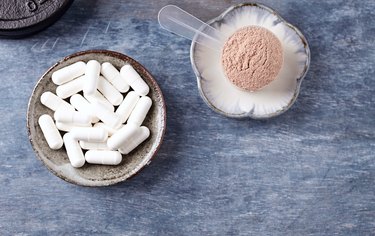
Creatine is an amino acid made in the kidneys, pancreas and liver, and found in red meat and seafood. It is often used by athletes to enhance athletic abilities and help to grow muscle mass. Some people have a creatine reaction, leaving them wondering if an allergy is to blame.
Creatine is found naturally in food and is made within the body. The Mayo Clinic notes that vegetarians and vegans often have low levels of creatine and can benefit from supplementation. Athletes and exercise enthusiasts may also see benefits from taking creatine. It is important to be aware of the potential side effects of creatine ingestion and to watch for a potential creatine reaction.
Video of the Day
Video of the Day
Read more: The 10 Best Supplements
What Is Creatine Used For?
The American Council on Exercise explains that evidence has grown over the past several years to suggest that creatine can be helpful for a variety of reasons specific to athletic training and workout performance outcomes. Creatine is found in muscle tissue and is depleted during exercise. Since creatine helps to produce the energy needed in intense, short bursts of exercise, supplementing with this amino acid can help improve performance.
The Mayo Clinic agrees, stating that sprinters and weight lifters, in particular, can benefit from supplementing with creatine. Moreover, a review published in the June 2017 issue of the Journal of the International Society of Sports Nutrition (JISSN) reveals that creatine is beneficial for much more than just exercise performance.
It can aid in preventing and reducing potential injuries, reducing injury severity and augmenting the rehabilitation process. It can also increase the body's tolerance for heavy training loads.
Clinical applications of creatine are also seen in the research, according to the JISSN. The amino acid has been shown to produce positive outcomes in diabetes, brain and heart ischemia, adolescent depression, osteoarthritis, pregnancy, aging, fibromyalgia and neurodegenerative diseases such as muscular dystrophy, Parkinson's disease and Huntington's disease.
Is Creatine Safe to Take?
Some people claim they experience an adverse creatine reaction. There have been accounts of stomach cramping and diarrhea when taking high doses. There is no evidence, however, that creatine causes allergic reactions such as creatine rash or creatine hives. There is also no connection known between creatine and eczema.
The JISSN states that extensive studies have not produced any evidence of consistent side effects, apart from weight gain in some cases. The authors stress that thousands of studies have been conducted, with billions of servings of creatine, and this is the only known side effect.
Even infants, pregnant people and older adults show no adverse health risks when dosing with 0.3 to 0.8 grams a day, per kilogram of body weight, for up to five years. A November 2018 review of the research in Frontiers in Nutrition backs up these statements.
However, if you suspect that you are experiencing an allergic reaction, or negative side effects due to creatine supplementation, discontinue use and be sure to speak to your doctor. As well, the Mayo Clinic cautions against supplementing with creatine if you take nephrotoxic drugs such as nonsteroidal anti-inflammatory drugs like ibuprofen, naproxen sodium and cyclosporine.
Mayo Clinic also warns against taking caffeine or ephedra with creatine, as they may decrease efficacy, and combining all three could increase your risk of stroke or other serious side effects.
Read more: How to Get Rid of an Allergic Reaction Rash
- Mayo Clinic: "Creatine"
- Journal of the International Society of Sports Nutrition: "International Society of Sports Nutrition Position Stand: Safety and Efficacy of Creatine Supplementation in Exercise, Sport, and Medicine"
- American Council on Exercise: "Will Creatine Supplements Increase the Size and Strength of My Muscles?"
- Frontiers in Nutrition: "Safety of Creatine Supplementation in Active Adolescents and Youth: A Brief Review"